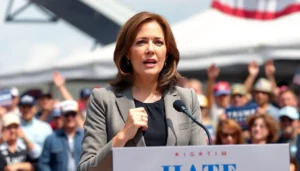Navigating the world of diplomacy can feel like walking a tightrope, especially when it comes to pronouncing the word itself. It’s a term that carries weight, yet many stumble over it like they’re trying to pronounce a foreign dish at a fancy restaurant. But fear not! Mastering the pronunciation of “diplomacy” not only boosts confidence but also helps avoid those awkward moments when discussing international relations.
Table of Contents
ToggleUnderstanding Diplomacy Pronunciation
Mastering the pronunciation of “diplomacy” enhances confidence in discussions related to international relations. Pronunciation accuracy helps prevent awkward moments.
Phonetic Breakdown
The phonetic representation of “diplomacy” is /dɪˈpləʊ.mə.si/. Each syllable plays a distinct role in its pronunciation. The emphasis lands on the second syllable, “plo.” Breaking it down further, the first syllable “dip” sounds akin to “dip.” The second syllable “lo” rhymes with “glow.” Lastly, “ma” shortens to a quick “muh,” and “cy” ends with a gentle “see.” Understanding these elements provides clarity in pronunciation.
Common Mispronunciations
Pronunciation challenges often stem from common misinterpretations of “diplomacy.” Many mistakenly pronounce it as “dip-luh-muh-see,” disrupting the natural flow. “Dip-lom-acy” is another frequent error, maintaining a heavy emphasis on the first syllable. People occasionally slide syllables together, producing “diplom-see,” which alters the word’s structure. Each mispronunciation can lead to misunderstandings in communication regarding diplomacy topics. By identifying and correcting these variations, he or she can confidently engage in conversations.
Importance of Accurate Pronunciation

Accurate pronunciation fosters clearer communication in discussions about diplomacy. Mispronunciations can confuse listeners and disrupt dialogue.
Impact on Communication
Effective communication hinges on proper pronunciation. Mispronouncing “diplomacy” may distract from the message. Clarity enhances understanding. Speaking clearly helps convey respect for the subject matter. When diplomats discuss sensitive topics, precise pronunciation is crucial. Listeners focus on content rather than struggling with pronunciation. Consequently, mastering pronunciation improves overall discourse.
Role in International Relations
Accurate pronunciation signifies professionalism in international relations. Diplomats represent their countries, so clear speech reflects competency. Miscommunication can lead to serious misunderstandings, impacting diplomatic relations. Correct pronunciation also builds trust between negotiators. Consistent clarity strengthens international partnerships and agreements. Emphasizing proper articulation fosters collaborative dialogue on global issues. Ultimately, pronunciation plays a vital role in successful diplomacy.
Tools for Improving Pronunciation
Various tools exist to enhance pronunciation skills, especially for the word “diplomacy.” Utilizing these resources can build confidence and improve clarity.
Online Resources
Numerous online platforms offer pronunciation assistance. Websites like Forvo allow users to hear native speakers enunciate “diplomacy.” Pronunciation dictionaries such as Cambridge and Merriam-Webster provide audio examples and phonetic breakdowns. YouTube also features videos specifically dedicated to pronunciation, showcasing correct and commonly mispronounced variations. Engaging with these resources consistently aids in mastering the pronunciation and contributes to clearer communication.
Mobile Applications
Mobile applications serve as convenient tools for pronunciation practice. Apps like HelloTalk enable language exchange with native speakers, aiding in real-time pronunciation improvement. Additionally, programs such as Speechling offer personalized feedback on pronunciation after recording voice samples. Anki provides flashcards with audio clips, reinforcing correct sounds through repetition. Regularly using these applications fosters sustainable progress, making “diplomacy” pronunciation more accessible and effective.
Tips for Practicing Diplomacy Pronunciation
Improving pronunciation of “diplomacy” involves focused listening and speaking practices. These methods enhance clarity and build confidence in conversations surrounding international relations.
Listening Exercises
Engaging in listening exercises significantly aids pronunciation skills. Hearing the correct pronunciation on platforms like Forvo or YouTube allows individuals to familiarize themselves with native speaker articulation. Regularly listening to podcasts about diplomacy assists in understanding context and intonation. Repetition of audio clips encourages retention of the pronunciation features, particularly the emphasis placed on the second syllable, “plo.” Individuals can also use pronunciation dictionaries such as Cambridge and Merriam-Webster for audio examples, reinforcing their auditory learning process.
Speaking Drills
Incorporating speaking drills into daily practice enhances verbal skills. Speaking out loud while mimicking native speakers promotes accurate pronunciation. Repeating the word “diplomacy” in varied contexts strengthens familiarity. Practicing in front of a mirror can provide visual feedback, aiding in adjusting mouth movements. Utilizing mobile applications like HelloTalk and Speechling encourages users to record themselves and receive immediate feedback. Building a daily routine that incorporates these speaking drills fosters consistent improvement and leads to greater comfort during diplomatic discussions.
Mastering the pronunciation of “diplomacy” is essential for effective communication in international relations. By focusing on the correct articulation and utilizing available resources, individuals can enhance their confidence and clarity. This not only prevents misunderstandings but also fosters professionalism and respect in discussions. Engaging with pronunciation tools and practicing consistently will lead to significant improvements. As individuals refine their speaking skills, they’ll find that clearer communication strengthens relationships and promotes successful dialogue in the complex world of diplomacy.





